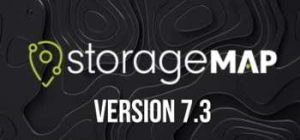Datadobi Launches StorageMAP 7.3
To enable smarter data automation, governance, and compliant S3 migration
This is a Press Release edited by StorageNewsletter.com on June 25, 2025 at 2:02 pmDatadobi, Inc. launched the latest version of StorageMAP, its enterprise heterogeneous unstructured data management solution.

Delivering new capabilities to orchestrate and automate data management tasks across file and object storage, StorageMAP 7.3 enables organizations to create policy-driven workflows, act on data more precisely, and migrate between S3-compatible platforms while maintaining compliance.
Workflow automation
StorageMAP 7.3 introduces policy-driven workflows that allow administrators to define tasks executed by its workflow engine in response to specific triggers, such as a time schedule. A ‘dry run’ feature facilitates reviewing the scope of a policy before full execution.
These new workflows support a wide range of use cases, including periodic automated archival, creating data pipelines to feed GenAI applications, identifying and relocating non-business-related data to a quarantine area, and more. Once policies are published, StorageMAP runs the workflows on schedule without requiring manual supervision.
Granular deletion and targeted data control
In addition, StorageMAP 7.3 adds support for granular file-level deletes. Administrators can identify files that match specific criteria and save them as input to a targeted delete job, which StorageMAP will execute. Each delete job generates a report that documents the job’s details and outcome.
This functionality addresses situations where a coarse-grained directory-level deletion is not possible due to the presence of both relevant and disposable data. By enabling precise file selection, StorageMAP ensures that administrators can apply accurate and effective deletion policies.
Object migration enhancements
StorageMAP 7.3 also enhances its core object migration functionality by supporting the migration of locked objects between S3-compatible storage systems. This allows compliant data stored in a Write Once Read Many (WORM) format to be relocated across different vendor platforms while retaining its retention date and legal holds.
To support cost and performance objectives, the solution includes the ability to select the S3 storage class during object migration or replication. By specifying the desired storage class at the time of the job, organizations can avoid unnecessary post-migration lifecycle policies and ensure data is written directly to the appropriate tier.
“StorageMAP 7.3 marks a major step forward in enabling true automation for unstructured data management,” said Carl D’Halluin, CTO, Datadobi. “Organizations can now define and execute policy-based actions at scale, removing the bottlenecks inherent to existing manual processes, making their file and object storage environments far more responsive to operational needs.“
“Unstructured data continues to proliferate across hybrid environments and organizations need solutions that not only provide visibility but also enable decisive action,” said Simon Robinson, principal analyst, Enterprise Strategy Group, now part of Omdia. “Datadobi is addressing several operational pain points by introducing policy-driven automation and greater control over how data is managed, deleted or migrated, especially in compliance-sensitive scenarios.“
Customers dealing with increasingly complex data landscapes require solutions that enable them to stay in control without incurring additional operational overhead. StorageMAP 7.3 offers a practical way to address these important challenges by reducing the time teams spend on routine tasks and helping them move critical data without disrupting compliance or performance.













 Subscribe to our free daily newsletter
Subscribe to our free daily newsletter


